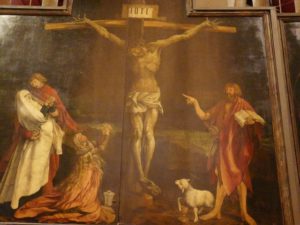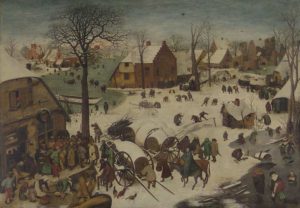The issue of death, an unescapable presupposition
The issue of death, as any theological question, initially posed the problem of the reference, of the ultimate authority we accept as a criterion of truth. And basically the choice is either the Bible, subject to human reason, as honest and enlightened as it may be, or the biblical revelation explained by the Holy Spirit who is given as a guide to anyone who is born again by him.
Every theological reflection is required to start with the basic step of this choice and to submit to the authority of the Holy Spirit in charge of “guiding into all truth” and given to illuminate the intelligence we do not give up and we use under his control. This is the famous bet of Blaise Pascal. The basic principle is 1 Corinthians 2.6-10 and especially verse 9.
Now we do speak wisdom among the mature, but not a wisdom of this age or of the rulers of this age, who are perishing. Instead we speak the wisdom of God, hidden in a mystery, that God determined before the ages for our glory. None of the rulers of this age understood it. If they had known it, they would not have crucified the Lord of glory. But just as it is written, “Things that no eye has seen, or ear heard, or mind imagined, are the things God has prepared for those who love him.” God has revealed these to us by the Spirit. For the Spirit searches all things, even the deep things of God.
A progressive revelation
It is clear that the fate of the deceased in the afterlife and the fact of the resurrection are subject to progressive revelation throughout the Old Testament, through bright steps as Job 19.25-27 and others in Isaiah , for instance :
As for me, I know that my Redeemer lives, and that as the last he will stand upon the earth. And after my skin has been destroyed, yet in my flesh I will see God,whom I will see for myself, and whom my own eyes will behold, and not another. My heart grows faint within me.
In the New Covenant, Jesus provides vital information
Luke 16.19-31, the parable of Lazarus and the rich man
There was a rich man who dressed in purple and fine linen and who feasted sumptuously every day. But at his gate lay a poor man named Lazarus whose body was covered with sores, who longed to eat what fell from the rich man’s table. In addition, the dogs came and licked his sores.
Now the poor man died and was carried by the angels to Abraham’s side. The rich man also died and was buried. And in hell, as he was in torment, he looked up and saw Abraham far off with Lazarus at his side.
So he called out, ‘Father Abraham, have mercy on me, and send Lazarus to dip the tip of his finger in water and cool my tongue, because I am in anguish in this fire.’
But Abraham said, ‘Child, remember that in your lifetime you received your good things and Lazarus likewise bad things, but now he is comforted here and you are in anguish. Besides all this, a great chasm has been fixed between us, so that those who want to cross over from here to you cannot do so, and no one can cross from there to us.’
So the rich man said, ‘Then I beg you, father– send Lazarus to my father’s house (for I have five brothers) to warn them so that they don’t come into this place of torment.’
But Abraham said, ‘They have Moses and the prophets; they must respond to them.’
Then the rich man said, ‘No, father Abraham, but if someone from the dead goes to them, they will repent.’
He replied to him, ‘If they do not respond to Moses and the prophets, they will not be convinced even if someone rises from the dead.
A parable! Many people laugh at seeing someone taking seriously a “fable”, a “fairy tale.” He laughs best who laughs last”, says the proverb. Why would God take care to cross 2,000 years with what would merely be a fairy tale?
Some points to remember:
– Human life does not end with death, but gets into a new stage;
– The beyond is divided into two areas and we cannot go from one side to the other;
– Death divides humanity into two parts, radically, finally and irrevocably;
– Everyone goes for eternity on the side he has chosen or neglected to leave during his lifetime;
– So everyone decides himself and on earth about what will be his eternal destiny;
– Everyone is waiting there for the judgment that will seal his current situation for eternity;
– The Word of God is available in order to warn us about this reality and it is the only authority able to convince, if we are ready to take it seriously; a miracle does not have such an authority. Sola scriptura (Scripture alone)
Luke 23.39-43, the few words exchanged between Jesus and one of the criminals
One of the criminals who was hanging there railed at him, saying, “Aren’t you the Christ? Save yourself and us!”
But the other rebuked him, saying, “Don’t you fear God, since you are under the same sentence of condemnation? And we rightly so, for we are getting what we deserve for what we did, but this man has done nothing wrong.”
Then he said, “Jesus, remember me when you come in your kingdom.”
And Jesus said to him, “I tell you the truth, today you will be with me in paradise.”
The man acknowledged that he was guilt and punished justly. He has understood that Jesus is innocent, does not deserve this death but accepts it without protest for a reason that escapes him, the criminal. He really seems to have understood that Jesus is the Messiah and he draws conclusions. He has especially understood that for Jesus this death is not the end of his action; Jesus is coming back, i.e. he will come back to life “in his reign”, i.e. as the Messiah invested with a royal authority he will have on this earth.
The man asks him to “remember him“, to have compassion with him. Then he gets this wonderful promise: “I tell you the truth, to-day you will be with me in paradise”. In accordance with what? With the total confidence he has expressed to Jesus in whom he recognized the Messiah after he repented. Sola gratia and sola fide. (Faith alone and Grace alone).
Those who have trusted God are gathered with Jesus, their Saviour
Jesus’ death on the cross thus causes a profound change in the “realm of the dead” as Jesus himself had described it in Luke 16. Those who, like Lazarus or this criminal, have put their trust in God, are, at the moment of their death, removed from the side where Lazarus came after his death or even do not go there, but are now united with Jesus they welcomed as their Saviour. On the side of the rich man there is no change: he just remains there and waits for the final judgment that already frightens him and that he would like, too late, to spare to his brothers.
After having finally closed his eyes on this world, the person who trusted in God opens them in the next moment on the world of which Jesus is the center, he is united with the One he received as his Saviour and the Ruler of his life.
No question of annihilation!
In none of these texts and in no other place in the Bible, even in the oldest texts of the Old Testament, there is any question of full and final annihilation. Even other religions, monotheistic or not, do not know of it. This invention is as misleading and casual, i.e. thoughtless than “the second chance” of Jehovah’s Witnesses or of other error movements.
Misleading, because it’s merely a human affirmation without divine ratification: how would God be obliged to perform what a man says about him, at odds with his revelation? But it is true that some theologians are at ease with the majesty of God and the authority of his revelation.
Casual also, because one evacuates by a simple statement (one is unable to confirm) what God has said, or God is supposed to say the opposite of what a reader without prejudice understands. If it were true, it would nicely suit the rich man who would be free from any liability. There would be no reason for him to want to spare at all costs to his brothers to join him where he is. The trouble is that Jesus does not at all say that everything is over for him, he says quite the opposite. Who is right? Jesus or the human mind which rejects what bothers it ? This theory of annilation says nothing about what happens to Lazarus, and if it were true, it would be as unfair for him as for the rich man.
About a good use of reflection
There is nevertheless no question of despising theology. There is a good theology, grounded on the principle of 1 Corinthians 2 and considering the Bible as absolute authority in matters of faith and conduct. There is also a theology that can be called mediocre, because in it man stands above God and the Bible, it is man who decides of what is true, what is myth, human invention or addition. At that rate these works can be very smart, original, insightful about human nature, but they cannot bring us closer to God. And from the standpoint of authority the difference is slim compared to philosophy.
A major principle of Nietzsche himself, the German atheistic philosopher, can be usefully applied to our lives and our thinking, “Accept as true only what you yourself have found true! ” ( in this cas: you under God’a authority)
The book of Acts (17.10) also reminds us that the Jews of Berea …“examined the Scriptures every day to see if what Paul said was true”.
But do not ask too much either to philosophy, not more than it can give.
J.J.S.



